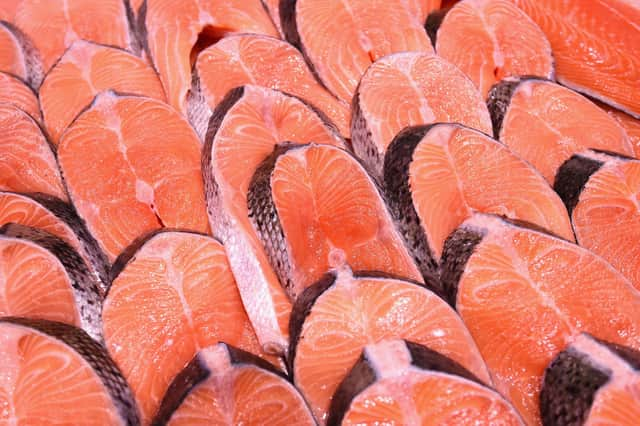Scottish salmon is highly profitable, a good source of protein and may be more nutritious than you thought – Tavish Scott


But our industry is about far more than pounds and pence: Scottish salmon is also the best, healthiest and most nutritious product that we can present to consumers whether here in the UK or around the world.
Independent and expert research has repeatedly confirmed the health benefits of eating salmon, for both the young and old.
Advertisement
Hide AdAdvertisement
Hide AdAnd now a new nutritional analysis of Scottish salmon carried out by the University of Stirling has found even greater benefits.
Figures for vitamin D and omega-3s are seven to eight per cent higher than previous tests conducted in 2003 and 2020, indicating that improvements in the way producers in Scotland are rearing and feeding their stock seem to have paid off.
The analysis has found that a single portion of farm-raised salmon provides 70 per cent of daily vitamin D needs. This is particularly important at this time of year, when the lack of sunshine in Scotland makes it harder for humans to produce it naturally.
Salmon also has 4.5 times the daily recommendation for special omega-3 fats found in marine foods, more than half our protein needs, and 40 per cent of the vitamin E recommendation. In fact, Scottish salmon actually contains more protein per gram than eggs.
The study collected 15 samples of farm-raised Scottish salmon, representative of typical Scottish produce, and put them through a variety of laboratory tests to assess nutrient levels. The findings are welcome, if unsurprising.
In light of global obesity rates, governments and food and health advisory bodies in Europe and the United States are encouraging people to consume more fish.
Expert dietitians recommend that adults and children should eat two weekly servings of fish – and one of these should be oily fish, like Scottish farm-raised salmon.
Dietitian and TV nutritionist Dr Carrie Ruxton says that if everyone followed the advice to eat one serving of oily fish a week, “we would get more than two thirds of our weekly omega-3 recommendation in that single meal”.
Advertisement
Hide AdAdvertisement
Hide AdThere are benefits for both the young and the old. In a University of Oxford study, some children given omega-3s and omega-6s showed improvements in learning and concentration.
And for older people, while the degeneration of cells and organs are part of the natural ageing process, by taking careful dietary steps you can help to minimise the effects.
The omega-3s in salmon, known as EPA and DHA, are a great way of maintaining a healthy heart, and medical trials with these essential fatty acids have also shown that there is a significant protection from a further incident for people who have already suffered from a cardiac condition.
So while much is always made of the industry’s significant economic contribution, the health benefits must never be overlooked. In fact, the two go hand-in-hand.
Scottish salmon is not just UK shoppers’ number one fish of choice, it is also the top food export, enjoyed by consumers in more than 50 countries.
Founded about 50 years ago, the Scottish salmon farming sector now accounts for about 40 per cent by value of Scottish food exports.
One key market is France, where this year will mark 30 years of Scottish salmon being awarded the coveted French Label Rouge designation.
And as exports continue to grow, we have an opportunity to supply protein to an ever-expanding worldwide population. The global market, if not absolutely insatiable, still has a huge potential for growth within it.
Advertisement
Hide AdAdvertisement
Hide AdSalmon production has the lowest carbon footprint of any comparable livestock, it uses less fresh water, has a better feed-to-protein ratio and produces more protein than any of its competitors.
And the world needs aquaculture to feed its growing population. Consumption of aquaculture seafood overtook wild-caught seafood in 2014 but it has to rise to at least 62 per cent of global consumption by 2030 if we are going to play our role in feeding the world.
So it’s incredibly encouraging that exports of Scottish salmon into Europe during 2021 exceeded expectations, despite all the challenges.
With Covid-related restrictions continuing, both the export market and the hospitality trade – a key market for salmon – looks like taking another hit after all the pain they have already felt.
Scotland’s salmon producing companies and the logistics industry have shown huge resilience and flexibility in dealing with these challenges.
There are 3,500 separate businesses who play their part in the salmon story and taking a great Scottish product to the consumer.
We have faced labour shortages and, closer to home, a lack of housing for our staff, particularly in rural and island Scotland.
But as we look ahead to the rest of 2022, the overall trading picture looks brighter with markets in the US and China stronger than they have been since the start of the pandemic.
Advertisement
Hide AdAdvertisement
Hide AdOur governments want to help drive an export-led trade recovery by actively promoting salmon around the world in existing and new markets. That is most welcome.
This month, an independent report into regulatory change commissioned by the Scottish government will report.
We look forward to seeing the recommendations from Professor Russel Griggs and working with government, regulators and stakeholders on their implementation.
This, alongside the government’s plan to produce an aquaculture vision will be an important focus.
But, above all, the priority must be reminding consumers that Scottish salmon is the best, healthiest and most nutritious product that you can put on your plate.
Tavish Scott is chief executive of Salmon Scotland, the voice of Scottish farm-raised salmon
Comments
Want to join the conversation? Please or to comment on this article.